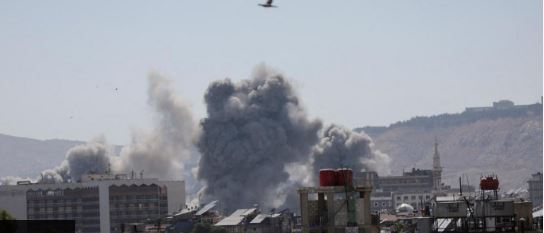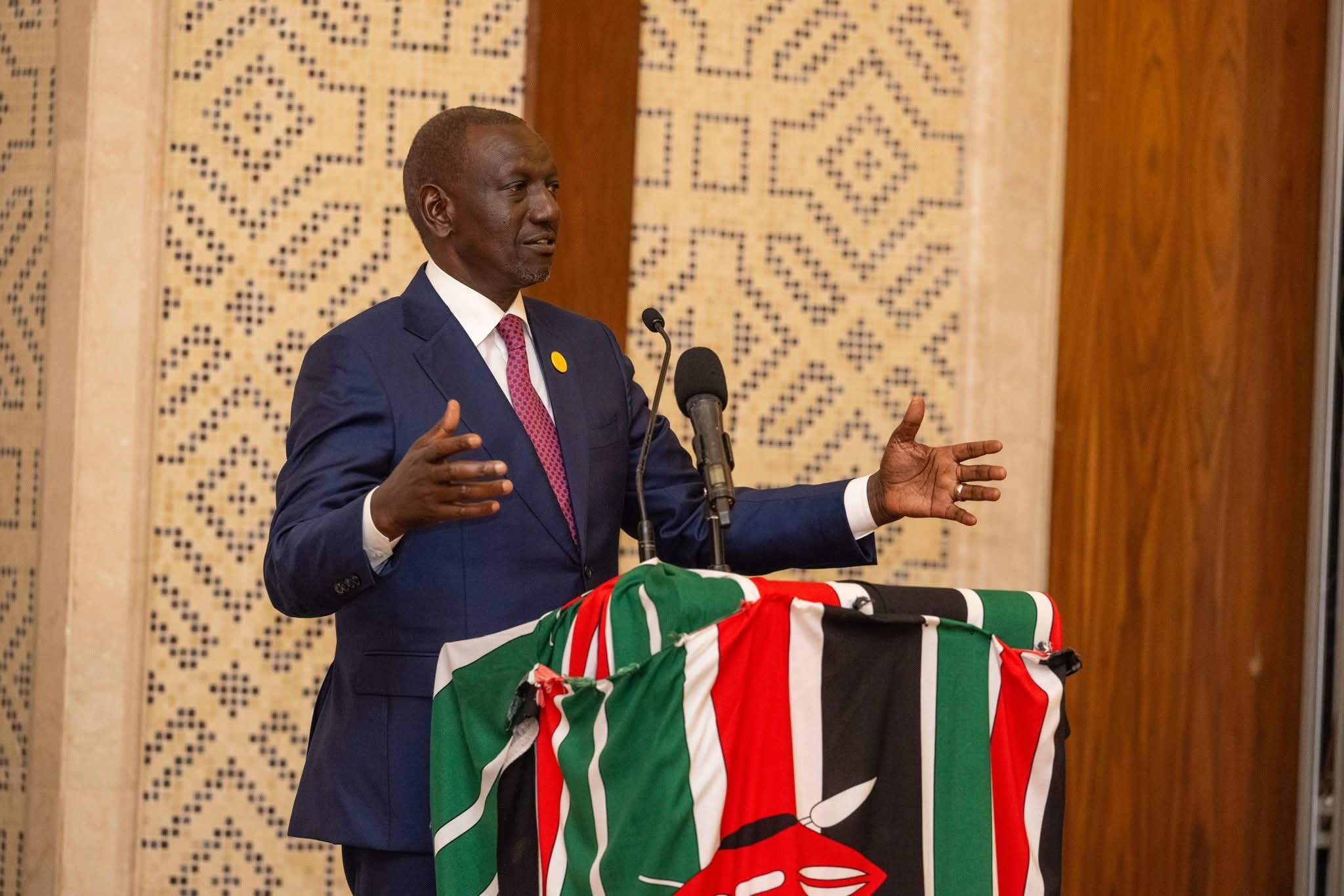

Israel has intensified its airstrikes on Syria, including on the capital Damascus, as it says it is intervening in support of the minority Druze community, who are engaged in an ongoing conflict with other Syrian armed groups.
Defence Minister Israel Katz has shared a video of a live news broadcast that shows a direct hit on a Damascus building.
Israel defence minister: 'warnings have ended and painful blows to come'
Shortly after Israeli strikes on Damascus began, Israel's defence minister shared a statement of intent on social media.
"The warnings in Damascus have ended - now painful blows will come," Israel Katz writes.
Katz says the Israeli military will "continue to operate forcefully" in Suweida, the area of southern Syria where Israel has recently intervened in clashes between the minority Druze community and other armed groups.
He then speaks directly to the Druze community in Israel, saying the Israel Defence Forces will protect the Syrian Druze population.
"Prime Minister Netanyahu and I, as Minister of Defence, have made a commitment - and we will uphold it," he adds.
Katz also shared a video of a live TV news broadcast, showing a building in Damascus being hit by a strike and the on-air newsreader ducking for cover.
IDF says it struck Syrian regime's military HQ
The Israel Defense Forces (IDF) confirmed that its forces have struck the entrance of the Syrian government's military headquarters in the capital, Damascus.
In a post shared on X, the IDF says it "continues to monitor developments and the regime's actions against Druze civilians in southern Syria".
It goes on to say that on orders from Israeli politicians, the IDF is "striking in the area and remains prepared for various scenarios."
Smoke rises over Damascus following Israeli strikes
Some smoke can be seen rising above Damascus, following a new round of Israeli strikes on Syria's capital.
It appears the principal target was Syria's defence ministry headquarters, as confirmed by an Israeli statement and local media reports.
Syria condemns Israeli attacks in the south as 'criminal and illegal'
The Syrian government has not yet responded to this round of Israeli strikes, but a few hours ago it condemned what it calls Israel's "criminal and illegal behaviour" in the south of the country.
In a statement, the Syrian presidency called the ongoing fighting between Druze militias and Bedouin tribes unacceptable under any circumstances and contradictory to their principles.
Israel has recently begun intervening in the conflict, saying it is doing so to protect the minority Druze community from attacks.
The statement added that they will affirm their "full commitment" to investigating all the related incidents and will not allow those responsible to go unpunished.
The government said that it places the highest priority on "protecting security and stability" throughout Syria, and that justice is the standard by which they operate.
It concluded by reassuring the people of Suweida - a predominantly Druze city - that their rights will always be protected and that they will not allow anyone to influence their security or stability.
Nine injured in Damascus strikes - Syrian health ministry
Nine people have been injured as a result of Israeli strikes in Damascus, according to a preliminary assessment just released by the Syrian health ministry.
Who are the Druze?
The Druze faith is an offshoot of Shia Islam with its own unique identity and beliefs.
They have historically occupied a precarious position in Syria's political order.
Half of its roughly one million followers live in Syria, where they make up about 3% of the population, while there are smaller communities in Lebanon, Israel and the occupied Golan Heights.
Earlier this year, Israeli Prime Minister Benjamin Netanyahu warned he would not "tolerate any threat to the Druze community in southern Syria" from the country's new security forces.
He also demanded the complete demilitarisation of much of the south, saying Israel saw Syrian president Ahmed al-Sharaa's Sunni Islamist group, Hayat Tahrir al-Sham (HTS), as a threat.
Strikes on Damascus follow clashes between Druze and Bedouin
Israel’s strikes on Damascus on Wednesday come after armed clashes between Sunni Bedouin fighters and Druze militias in southern Syria began at the weekend.
The violence erupted in the predominantly Druze city of Suweida on Sunday, two days after a Druze merchant was reportedly abducted while travelling by road to Damascus.
On Tuesday, after two days of the deadly clashes, Israel said it had bombed Syrian government forces around Suweida.
Syrian forces have been accused of also attacking the Druze. The government has not responded to the specific allegations, but has condemned the attacks on Druze people and said its troops are there to restore order.
Israel's prime minister Benjamin Netanyahu, said he had ordered strikes on forces and weapons in the area because the government "intended to use [them] against the Druze". Syria has condemned Israel's involvement.
At least 200 people have been killed since the clashes started on Sunday, the UK-based monitoring group the Syrian Observatory for Human Rights said on Tuesday.
Three commanders killed in Israeli strikes on south, Syrian campaign group says
Three Syrian commanders leaders have been killed in Israeli strikes on southern Syria, according to the Syrian Observatory for Human Rights (SOHR) monitor.
The UK-based campaign group - which monitors and releases reports on casualties in Syria - says the strikes specifically targeted military convoys as defence ministry officials gathered.
It says the strikes came down in the countryside around the villages of Walgha and al-Majimar, near the city of Suweida where clashes between armed Druze and Bedouin groups have taken place in recent days.
The SOHR previously reported that seven military officials were killed in previous Israeli strikes in Suweida, including on a tank and military vehicle - bringing the total count to at least 10.
Syria's foreign ministry accuses Israel of 'inflaming tensions' in 'flagrant assault'
Syria's foreign ministry has condemned Israel's targeting of "government institutions and civilian facilities" in Damascus, as well as in Suweida following today's aerial attacks.
After Israel's strikes targeted the ministry of defence building in Damascus, as well as the area around the presidential palace, the foreign ministry says several civilians were killed and dozens more injured.
It says there was also "extensive damage to infrastructure and public services".
The foreign ministry accuses Israel of carrying out a "flagrant assault" in the pursuit of a "deliberate policy" to "inflame tensions, spread chaos and undermine security and stability in Syria".
"Syria holds Israel fully responsible for this dangerous escalation and its consequences," it adds.
Turkey, Lebanon and Iraq condemn Israeli attack
Here's a look at some of the regional reaction to today's attacks.
Israel's strikes on Damascus and its interventions in the south of the country are "an act of sabotage against Syria's efforts to secure peace, stability and security", Turkey says.
"The Syrian people now have a historic opportunity to live in peace and integrate with the world," the country's foreign ministry says in a statement.
It adds everyone "committed to seizing this opportunity must contribute to the Syrian administration's efforts to establish calm".
Lebanon's Prime Minister Nawaf Salam also condemns the attacks and has called on the international community to end the violence.
He describes the strikes as "a flagrant violation of Syria's sovereignty and a breach of the most basic principles of international law", adding in a statement that Israel's aggression "cannot be accepted".
Meanwhile, Iraq' foreign ministry says it rejects the "endangering" of Syrian lives and intensification of their "humanitarian suffering".
The statement also reiterates Iraq's "firm position" in opposing any attacks that violate the sovereignty of any country, warning Israel not to use the fighting in Suweida as a "cover to achieve expansionist goals."




















